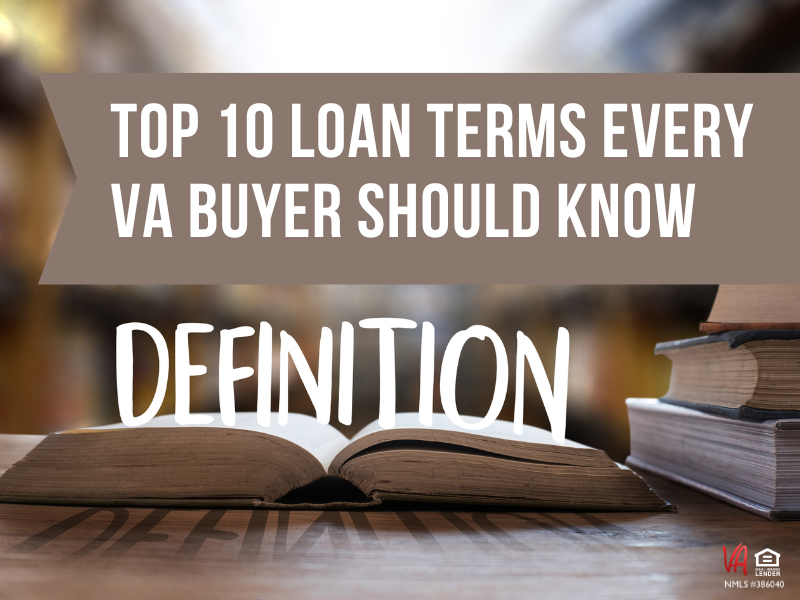Once upon a time in Happy Hawaii VA Home Buyer Land, we received a great company review from a customer who had one piece of advice for how we could improve the Hawaii VA Loans experience. She wrote simply, “more explanation on unfamiliar loan jargon.” We take our customer reviews seriously. So without further ado, here are the Top 10 Loan Terms Ever VA Buyer Should Know.

1. Closing Costs
Third party fees paid at the closing of a real estate transaction. Closing costs are incurred by either the buyer or the seller. Fortunately for VA buyers, a good portion of these costs are waived. On average, a VA buyer can save anywhere from $1500 – $2000 in closing costs compared to using other loan programs. We also provide additional ways to save money on closing costs in our 5 Ways to Save Money on Closing Costs e-book.
2. Conditional Loan Approval Letter
This is the highest level of pre-approval from a lender that you can bring to the table when you make an offer on a property. The letter or form, however, is not a guarantee that the borrower will get the funds needed to make the purchase. For example, if the lender bases borrower approval on the information given to the lender as of the application date, and the borrower then goes out and purchases a car with a new car loan, the lender who issued the conditional loan approval letter may withdraw approval for a real estate loan. The approval also might carry an expiration date.
3. Earnest Money Deposit (EMD)
An Earnest Money Deposit (EMD) is a dollar amount, specified in the purchase contract, that is given to escrow once your purchase offer is accepted. The funds deposited with escrow can be used towards down payment or to cover closing costs. In a VA transaction, if a borrower has enough credits from the lender or other parties, they can even get the full EMD back at closing.
4. Fee Simple
The most complete form of ownership. A fee simple buyer acquires ownership of the entire property, including both the land and buildings. The fee simple owner does not pay ground rents, but does pay maintenance fees and real property taxes. The fee simple owner has the right to possess, use the land and dispose of the land as they wish (sell it, give it away, trade it for other things, lease it to others, or pass it to others upon death).
5. Leasehold
The leasehold interest is created when a fee simple land-owner enters into an agreement or contract called a “ground lease” with a lessee. Leasehold interest differs from the fee simple interest in these important ways:
- The buyer of residential leasehold property does not own the land and must pay ground rent.
- The use of the land is limited to the remaining years covered by the lease.Therefore, upon completion of the lease, the land returns to the lessor, which is called reversion. Depending on the provisions of any surrender clause in the lease, the buildings and other improvements on the land may also revert to the lessor.
- The use, maintenance, and alteration of the leased premises are subject to any restrictions contained in the lease.
6. Loan-to-Value (LTV)
The loan-to-value (LTV) ratio is a financial term used by lenders to express the ratio of a loan to the value of an asset purchased. LTV ratio is calculated by dividing the amount borrowed by the appraised value of the property, expressed as a percentage. For example,if you buy a home appraised at $100,000 for its appraised value and make a $10,000 down payment, you will borrow $90,000 resulting in an LTV ratio of 90% (90,000 / 100,000).
7. Minimum Property Requirements (MPRs)
MPRs are set in place to protect the veteran from purchasing a home of substandard quality and to ensure the VA is guaranteeing a home that does not become a money pit of repairs for the new homeowner. The VA appraiser identifies MPR issues on the appraisal.
8. Paying Points
Discount points are charged if you want to “buy down” the interest rate lower than the current mortgage market rate. Up to two discounts points or 2% is considered to be a reasonable charge. Discount points may be paid by either the buyer or seller.
9. Recordation
The recordation date is the date of the official transfer/change of the title of the property from seller to buyer and registration of the lien with the state/county/official entity. In Hawaii, you normally get the keys to the home on this day. Once recordation takes place (often 2-3 days after closing documents are signed), escrow will contact the real estate agent and notify them of recordation clearance and the transaction has success fully recorded, whereupon the real estate agent will turn over the keys.
10. Underwriter/Underwriting
Underwriting refers to the process lenders use to determine the creditworthiness of a potential customer and property. Here are some responsibilities of an underwriter:
- The underwriter researches to ensure applicants represent themselves truthfully and to get a sense of the applicant’s finances.
- For real estate transactions, underwriters also determine whether the property’s sale price meets its appraised value and the property meets the loan program rules.
- Underwriters also ensure there’s no one else on the title, and whether the property is properly insured for any dangers due to natural disasters such as floods or earthquakes
Now that you’re familiar with these loan terms every VA buyer should know, contact a VA Loan Specialist. Call us at 808-792-4251 or fill out our secure, online loan application here.

